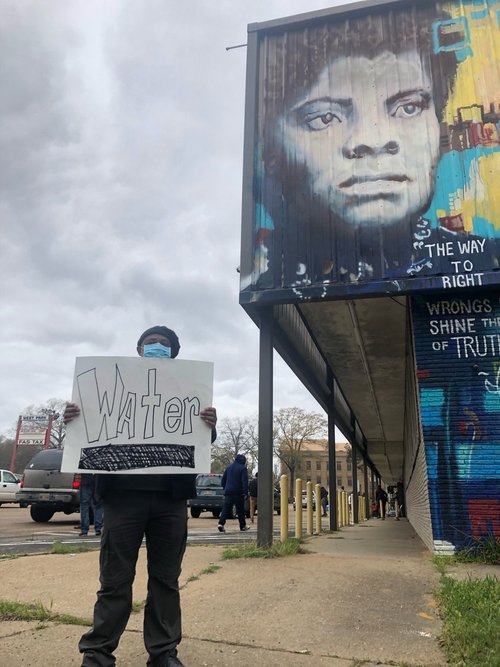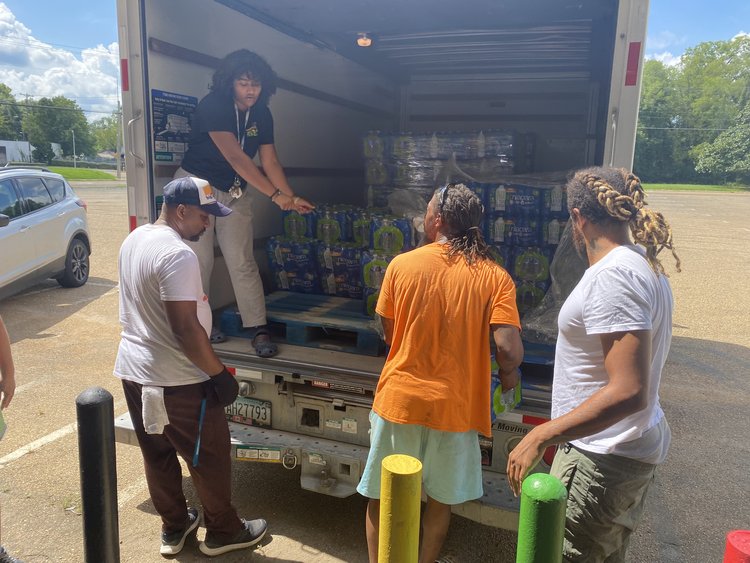In Jackson, Mississippi, around 15,000 residents have been left with no access to safe drinking water after flooding knocked out a treatment plant.
The crisis saw president Joe Biden declare a federal emergency to trigger aid efforts – but it has also intensified debate in the city over alleged racial discrimination, infrastructure neglect and shifting local demographics.
These issues have already brought efforts to reform the city in the shape of Cooperation Jackson, a network of worker co-ops which wants to develop a series of democratic institutions to empower workers and residents, and address the needs of poor, unemployed, Black or Latino people.
It has now launched the Justice 4 Jackson campaign to fix the water system and put right what it claims are “decades of systematic and intentional neglect due to environmental racism, capital flight and deindustrialisation”.
“This collapse didn’t have to happen,” it says. “As a result of the city’s declining tax base over the decade, it cannot pay for the repairs by itself.”
Because Jackson is home to the state capitol and serves as a base for federal government, its water system is used by those entities, and “they must pay their fair share in overhauling and modernising the system,” the campaign argues.
But, it claims, “the Republican, predominantly white, party leadership that has dominated state government for generations now, fundamentally refuses”, echoing the frustrations of residents who argue that systemic racism has led to the neglect of a city with an 80% Black population, with local activists telling NPR they have had to boil water for decades. NPR reports the city government’s frustration that it does not receive the funds needed to fix the infrastructure, while in turn the state government blames local mismanagement.
On the part of federal government, Michael Regan, administrator of the Environmental Protection Agency (EPA) administrator, said the city could be eligible for government loans and support under the Biden adminstration’s recent infrastructure package, but warned this would be contingent on “a plan that demonstrates how those resources will be spent”.

Mississippi’s Republican state governor, Tate Reeves, declared a state of emergency in response to the water crisis on 30 August, deploying the National Guard and instructing the Mississippi Emergency Management Agency to lead the effort in distributing drinking water and non-drinking water to the city.
His state government also opened seven state distribution sites to offer bottled water, bulk non-potable water, and hand sanitiser.
“The state is marshalling tremendous resources to protect the people of our capital city,” said Reeves. “It will take time for that to come to fruition. But we are here in times of crisis, for anyone in the state who needs it. That’s my responsibility as governor, and it is what everyone in my administration is committed to ensuring.”
Water pressure was restored to the city this week but it is still unsafe to drink and needs to be boiled and videos have been posted showing dirty water coming from taps. Some of the pipes are 100 years old and some residents have issued lawsuits claiming lead poisoning.
“This water system broke over several years and it would be inaccurate to claim it is totally solved in the matter of less than a week,” added Reeves. “There may be more bad days in the future. We have, however, reached a place where people in Jackson can trust that water will come out of the faucet, toilets can be flushed and fires can be put out.”
Reeves says that one option on the table is privatisation, which would see management of the water system outsourced to a contractor. Meanwhile, the city’s Democratic mayor, Chokwe Antar Lumumba, who ran for office on a radical programme, said he would consider a “maintenance agreement” with a private company to help alleviate staffing shortages, but has been vocal in his opposition to total privatisation.

Privatisation is likely to be controversial with city residents, after a 2010 deal with Siemens to install water meters and oversee billing ended in fiasco, with some residents receiving no bills and others receiving inaccurate, inflated ones. Lumumba’s administration launched a lawsuit against the company which ended in February 2020 with an $89.8m settlement, but the failure of the system increased pressure on the city’s infrastructure and finances.
Cooperation Jackson is calling for community-based solutions. It wants a drastic overhaul of utilities in the city and says there are decades of neglect to overcome. Its Justice 4 Jackson campaign has four demands – that:
- state and federal government immediately fund the complete overhaul of the Jackson water treatment and delivery systems
- the new system fully remains within the democratic control of the city of Jackson
- the new system be built by the people of Jackson and that over 50% of the contracts awarded be granted to either contractors from Jackson and/or Black and other minority contractors
- the new system be ecologically designed and built with as many locally and or regionally sourced resources as possible.
As well as seeking government action, Cooperation Jackson wants to take proactive steps to improve the situation through community action, and is proposing an emergency response and mutual aid network “that can serve our community in the event of water outages, future polar vortex freezes, tornados, hurricanes, floods, or massive social unrest”.
The campaign adds: “The suffering communities of Jackson cannot and must not wait on state and federal redress that might not ever come, given the ongoing legacy of racial neglect. So, we must be clear about building and fighting for the practical community-based solutions to the water and climate crisis that is underneath it, that we can implement ourselves.”
And it is proposing the development of community-based resources, including water catchment, treatment and delivery systems, solar farms and food networks to give Jackson’s people more sustainability and autonomy.
Cooperation Jackson is calling on supporters to donate to its organisation, or to other social justice groups in the city which do work in line with its vision; to contact President Biden and their representatives in the Senate and Congress in support of the campaign’s demands; and to volunteer if they have any relevant construction skills for water catchment systems and solar installations.
Co-op News has contacted the office of Tate Reeves at Mississippi state government for comment.

